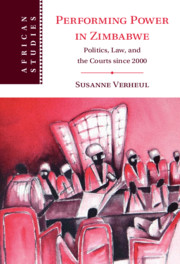Performing Power in Zimbabwe
Politics, Law, and the Courts since 2000
Part of African Studies
- Author: Susanne Verheul, University of Oxford
- Date Published: September 2021
- availability: Available
- format: Hardback
- isbn: 9781316515860
Hardback
Other available formats:
Paperback, eBook
Looking for an inspection copy?
This title is not currently available on inspection
-
Focusing on political trials in Zimbabwe's Magistrates' Courts between 2000 and 2012, Susanne Verheul explores why the judiciary have remained a central site of contestation in post-independence Zimbabwe. Drawing on rich court observations and in-depth interviews, this book foregrounds law's potential to reproduce or transform social and political power through the narrative, material, and sensory dimensions of courtroom performances. Instead of viewing appeals to law as acts of resistance by marginalised orders for inclusion in dominant modes of rule, Susanne Verheul argues that it was not recognition by but of this formal, rule-bound ordering, and the form of citizenship it stood for, that was at stake in performative legal engagements. In this manner, law was much more than a mere instrument. Law was a site in which competing conceptions of political authority were given expression, and in which people's understandings of themselves as citizens were formed and performed.
Read more- Discusses the contestations over law and politics in Zimbabwe after 2000
- Focuses on law as both a set of institutions and an ideal that is central to the construction of, and contestations over, state authority and citizenship
- Examines the conditions leading to, and the events within, politically-motivated trials as sites of performance and contestation
Reviews & endorsements
'In Verheul's masterful account, law shapes (and is shaped by) political subjectivities and norms in crisis-ridden post-colonial Zimbabwe. We see how law works within the state and how meaningful legal practices, claims and institutions can be, for both those in authority and those who resist.' Sara Rich Dorman, University of Edinburgh
See more reviews'Through a finely crafted interweaving of detailed courtroom ethnography, revealing interviews and carefully read legal documents, Susanne Verheul eloquently unfolds the complex relationships between history, law, politics, state authority and citizenship. While contextualised within Zimbabwe, this rich account and its analytical insights has great significance for a wide range of scholarly fields.' Amanda Hammar, University of Copenhagen
'A fascinating and vividly painted picture of the way in which power gets enacted in Zimbabwe's courtrooms and a must-read for socio-legal scholars and Africanists alike. Verheul manages to combine disciplinary perspectives and rich case material to dig deep into how power gets constituted and is performed. Highly recommended!' Barbara Oomen, Utrecht University
Customer reviews
Not yet reviewed
Be the first to review
Review was not posted due to profanity
×Product details
- Date Published: September 2021
- format: Hardback
- isbn: 9781316515860
- length: 272 pages
- dimensions: 235 x 158 x 20 mm
- weight: 0.55kg
- availability: Available
Table of Contents
Introduction: Law, state authority and the courts, 1. History, authority and the law in Zimbabwe, 1950–2002
2. 'Rebels' and 'good boys': examining the working conditions in Zimbabwe's attorney general's office after 2000
3. 'Zimbabweans are foolishly litigious': debating citizenship when engaging with a politicised legal system
4. 'What is abnormal is normal': performative politics on the stages of arrest and detention
5. Material and sensory courtrooms: observing the 'decline of professionalism' in Harare's magistrates'' courts
6. The trials of the 'traitor in Harare's magistrates' courts under the unity government
7. History, consciousness and citizenship in Matabeleland: the impact of the MLF case
8. Historical narrative and political strategy in Bulawayo's magistrates' courts: the case of Owen Maseko
Conclusion: 'Government is a legal fiction' – performing law, the state, citizenship and politics.
Sorry, this resource is locked
Please register or sign in to request access. If you are having problems accessing these resources please email lecturers@cambridge.org
Register Sign in» Proceed
You are now leaving the Cambridge University Press website. Your eBook purchase and download will be completed by our partner www.ebooks.com. Please see the permission section of the www.ebooks.com catalogue page for details of the print & copy limits on our eBooks.
Continue ×Are you sure you want to delete your account?
This cannot be undone.
Thank you for your feedback which will help us improve our service.
If you requested a response, we will make sure to get back to you shortly.
×





